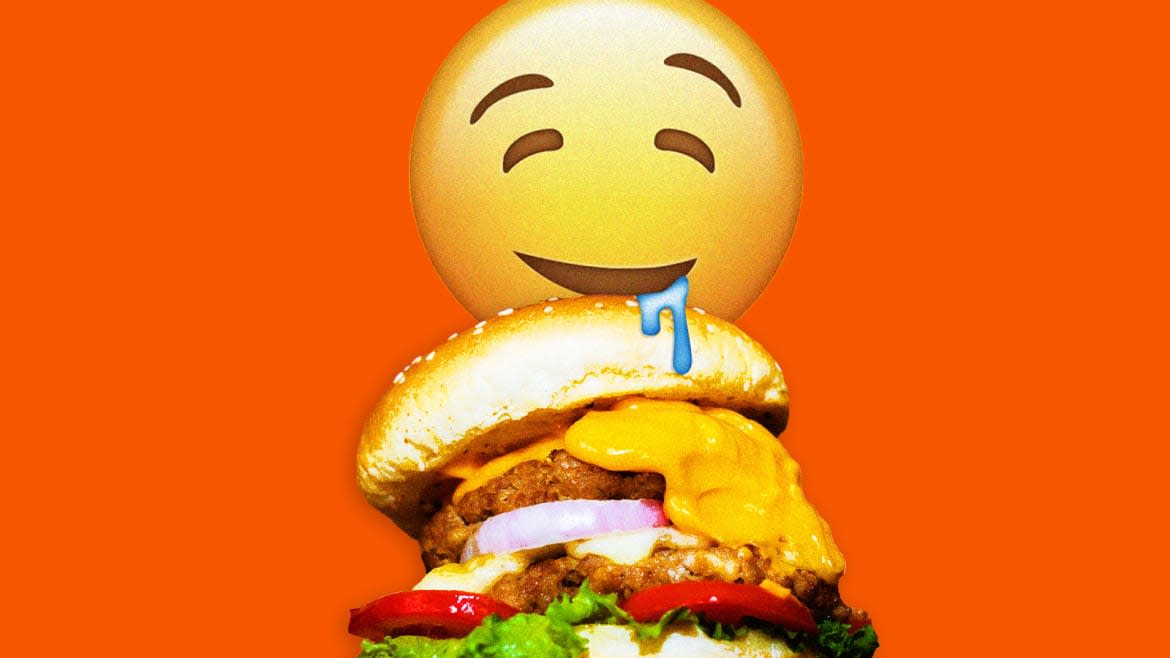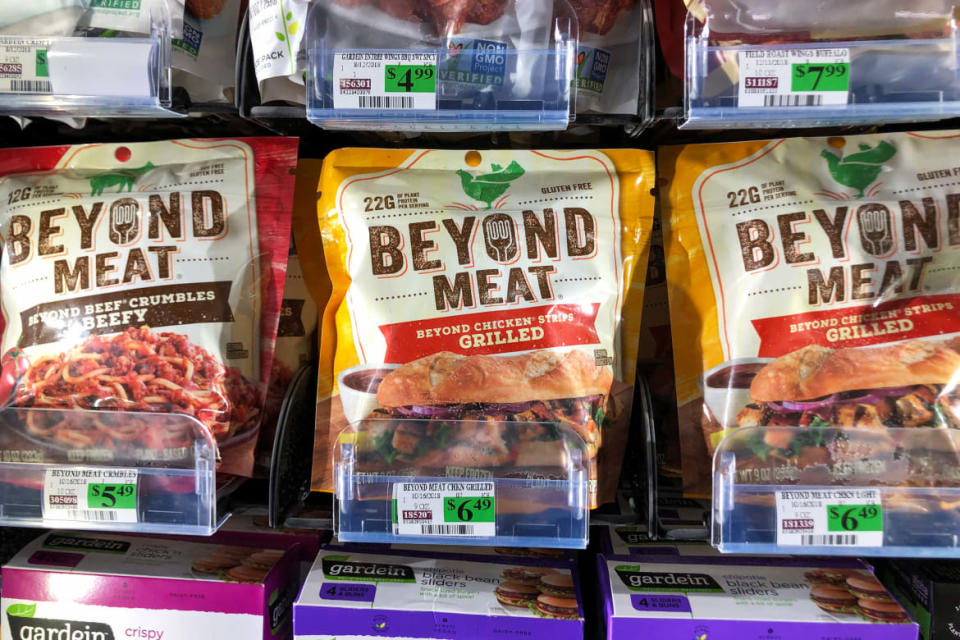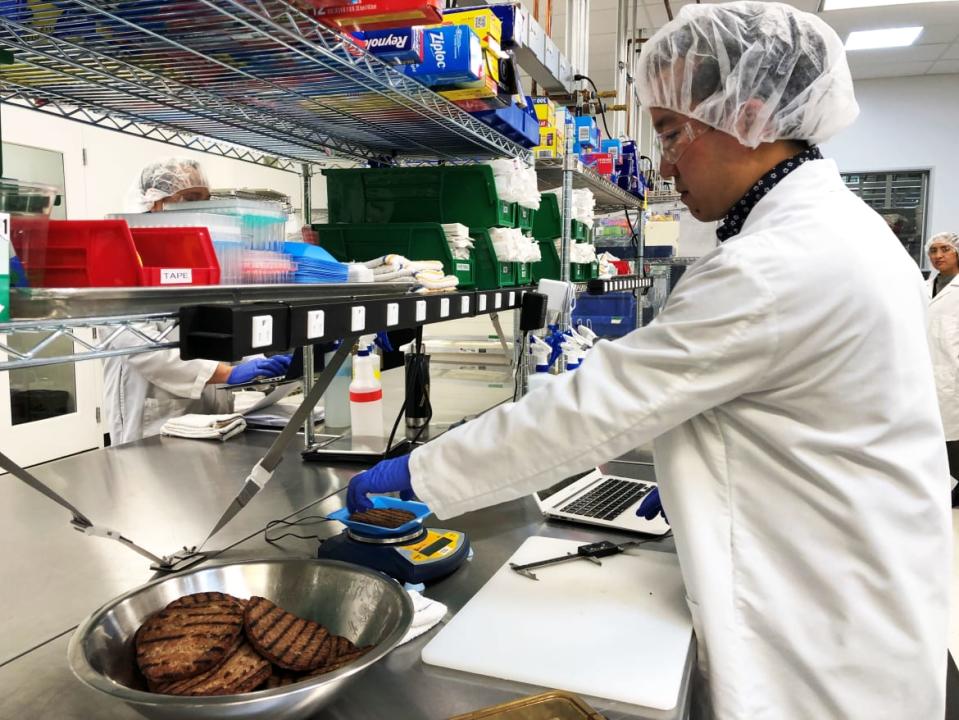Meatless Burgers Shouldn’t Be ‘Healthy’—They Should Be Tasty

You don’t need to be a vegan to know that plant-based meat isn’t the niche hippie fare it once was. Over the last ten or so years, Impossible Foods and Beyond Meat hit the mainstream. You no longer need to go to a specialty food store or a cult-favorite California restaurant to get your meatless burger fix. You can just go to your nearest Burger King or Carl’s Jr.
But after a few years of hype, sales of plant-based meat are reportedly lagging. Beyond Meat laid off about one-fifth of its international team last year, and it was recently reported that Impossible Foods is preparing to cut about 20 percent of its staff. According to one study, the percentage of shoppers who have tried Impossible products and say they’re less likely to try it again has risen. Sales are so slow that, according to a recent Bloomberg article, the end is near for meatless meat.
In fairness, pretty much every industry is struggling right now. We’re feeling the pain of inflation and may be headed for an even worse economic slump. There is, however, some evidence for the theory that plant-based meat is losing momentum. Sales figures continue to drop and fast food brand partnerships have come to quiet ends. While investors might be scratching their heads, wondering why Impossible Foods hasn’t exactly become the next Apple, the average layperson could probably tell you exactly what the problem is: they just don’t taste as good as meat.
Veganism Is Impossible, Because People Aren’t Perfect
The fact of the matter is that many people just don’t like the plant-based meat options we currently have. Studies consistently find that taste is the number one obstacle preventing Americans from cutting meat out of their diets. The meat substitutes currently on the market just don’t cut it as a replacement.
Part of the problem is that in the long history of human diets, and even in the context of new food technology, these meat alternatives are still very new. The modern meat industry has had over a century to refine its technology, making meat cheap, tasty, and widely available. Beyond Meat and Impossible Foods have had just a little over a decade.

Products from Beyond Meat Inc, the vegan burger maker, are shown for sale at a market in Encinitas, California, U.S., June 5, 2019.
But a large part of the problem is actually by design. Companies like Beyond Meat and Impossible Foods have deliberately made their products healthier than traditional meat, even at the cost of taste and realism. If they don’t reverse course, they will end up being just another food fad.
For context, they prioritized health for well-intentioned reasons: In 2020, there was a slew of criticism arguing that the new wave of plant-based meats weren’t nutritionally sound, chock full of sodium and fat. So in 2021, Beyond Meat reformulated its burgers to contain less saturated fat and fewer calories. And last year, Impossible Foods did a similar maneuver by releasing a new formulation with less saturated fat and more protein.
But here’s the painfully obvious reality—these medium-healthy products just don’t have a market.
Think about it: If you’re a person who is very concerned with health and nutrition, who balks at anything GMO or “processed,” you probably don’t eat beef burgers or chicken nuggets all that regularly to begin with. On the other hand, if you are a big burgers-and-fries person, you’ve probably already accepted that your favorite foods aren’t the healthiest. And, as research suggests, when consumers read that Beyond Popcorn Chicken, for example, has 50 percent less saturated fat than traditional chicken nuggets, they infer that it’s 50 percent less tasty.
Solving a Short-Term Food Shortage May Have Encouraged a Long-Term Collapse in Farming
In trying to straddle the line between tastiness and healthiness, companies are trying to appeal to everyone. Inevitably, that will lead to pleasing no one. “In the current sales slump, this is actually one of my biggest concerns for plant-based meat,” writes Jacy Reese Anthis, author of The End of Animal Farming. “I can imagine a slowdown of 10+ years in adoption if this nutritional norm isn't fixed.”

Impossible Foods product development associate scientist Kyle Okada measures plant-based burgers tailor-made for Burger King at a facility in Redwood City, California, U.S.
Unlike livestock farmers, plant-based meat makers have the advantage of being able to start from the ground up. They can work to shape their products however they see fit. They need to leverage this advantage if we’re serious about cutting our collective meat consumption.
Some, like Rachel Konrad, former chief communications officer at Impossible Foods, argue that it would be “irresponsible” to release a plant-based meat that’s unhealthy by design. Under different circumstances, I might agree. If food manufacturers all agreed to only produce healthy, high-quality foods, we’d all be a lot better off. But that’s not the world we live in.
The food industry knows that we’re wired to love salty, fatty, sweet foods, which is why they make stuff like Doritos. And almost 100 million people eat them each year. We can’t change what people crave, but we can provide them with a craveable option that doesn’t destroy the planet.
Some innovative entrepreneurs are already taking steps along the path to mega-tasty, not-so-healthy plant-based goodness. Slutty Vegan, which started as an Atlanta-based food truck and is now a chain of restaurants with locations in Georgia, Alabama, and New York City, is an exciting example. Their food is indulgent, to say the least: the Ménage à Trois sandwich, for example, includes a burger patty, shrimp, bacon, cheese, and standard burger fixings on a Hawaiian bun (all plant-based, of course). “Healthy” isn’t the mission statement, and that’s exactly what people love about it.
To be sure, making plant-based meat less healthy has some risks. It could, for example, make the products unwelcome in the health aisle of supermarkets or on the menus of restaurants and in school and hospital cafeterias as a healthy alternative. But given the stakes, companies like Beyond Meat and Impossible Foods need to pursue a high-risk, high-reward strategy.
Just How Good Is the Impossible Burger for You or the Planet?
And the stakes are high. Factory farmed meat is at the root of so many of the planet’s problems. Industrial animal agriculture provides ripe opportunities for highly contagious zoonotic diseases, like SARS, swine flu, and COVID-19 to hit the human population. It contributes to climate change and poses other environmental threats, like water pollution and deforestation. Anyone concerned with human health on a broad scale should be aware that such environmental degradation will continue to cause illness and death. And of course, we’re not the only ones whose lives are at stake—over four billion land animals have been slaughtered for food since the start of 2023, just in the U.S. alone. And most of those animals lived stressful, even torturous lives beforehand.
For us to have any chance of averting environmental disasters through our diets, businesses need to give the people what they want. What they really want. We need to appeal to people’s basest, most hedonistic desires and create a burger that no doctor would ever recommend.
A low-fat patty won’t save the world, but a big, steaming plant-based bacon cheeseburger dripping with grease and flavor might.
Get the Daily Beast's biggest scoops and scandals delivered right to your inbox. Sign up now.
Stay informed and gain unlimited access to the Daily Beast's unmatched reporting. Subscribe now.

